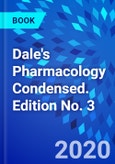- All content has been thoroughly revised and updated, with new coverage of fast-moving therapeutic areas such as the development of biologics, new therapeutics for cancer treatments, dermatology and immune mediated diseases, and new advances in pharmacological principles such as biased agonism. - Each chapter condenses key information to provide the necessary core knowledge, as well as essential therapeutic information. - Written by experienced teachers who provide a clear focus on what today's students need to know. - Ideal for exam preparation with explanatory diagrams throughout, important drugs identified with bold type, and multiple choice questions for self-assessment and review. - Enhanced eBook version included with purchase. Your enhanced eBook allows you to access all of the text, figures, and references from the book on a variety of devices.
Table of Contents
Section 1: Pharmacology and Drug Use1 Preface
2 Pharmacology, Drug Names, and Classification
Systems
Section 2: Fundamentals of Pharmacology
3 General Principles of Drug Action
4 Molecular Aspects of Drug Action
5 Pharmacokinetic and Other Factors Influencing Drug Action
6 Pharmacodynamics and the Measurement of Drug Action
Section 3: Drug Development
7 Drug Discovery and the Development of Small Molecules
8 Drug Discovery and the Development of Biologicals
9 Drug Safety, Toxicology, and Pharmacovigilance
10 Regulation of Drug Use
Section 4: Drug Actions on Body Systems
11 Outline of Transmission and Drug Action in the Nervous System
12 Drugs and Neurological Disorders
13 Drugs and Pain
14 Drugs and the Cardiovascular System
15 Drugs and Blood: Haematopoiesis and Haemostasis
16 Drugs and the Inflammatory and Immune Response
17 Drugs and the Endocrine and Metabolic Systems
18 Drugs and the Renal System
19 Drugs and the Pulmonary System
20 Drugs and the Musculoskeletal System
21 Drugs and the Gastrointestinal System
22 Drugs and the Kidney and Genitourinary System
23 Drugs and the Skin
24 Drugs and the Eye
25 Drugs and the Ear
26 Drugs Used in Anaesthesia
27 Drug Use in Disorders of Nutrition
28 Drug Use in Dentistry
Section 5: Drugs to Treat Infectious Diseases and Neoplasms
29 Antiviral Drugs
30 Antibacterial Drugs
31 Antifungal Drugs
32 Drugs and Parasites: Anti-protozoal and Antihelminthic Drugs
33 Drugs and Cancer
Section 6: Drugs in the Community
34 Prescribing and Personalising Drug Treatments
35 Venoms, Toxins, Poisons, and Herbs
36 Drug Dependence and Drug Abuse
Authors
Clive P. Page Director, Sackler Institute of Pulmonary Pharmacology, Institute of Pharmaceutical Science, King's College London, UK. Simon Pitchford Sackler Institute of Pulmonary PharmacologyInstitute of Pharmaceutical Science
King's College London
London, United Kingdom.








